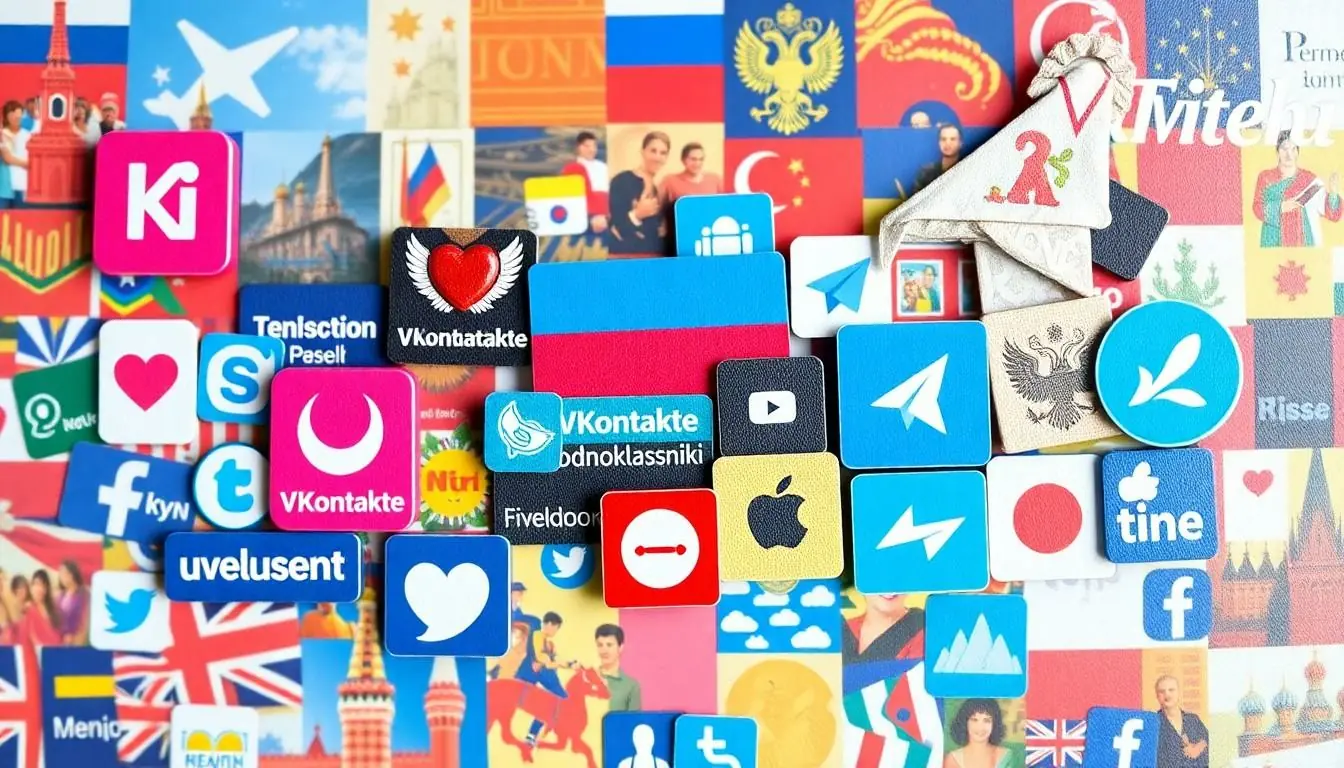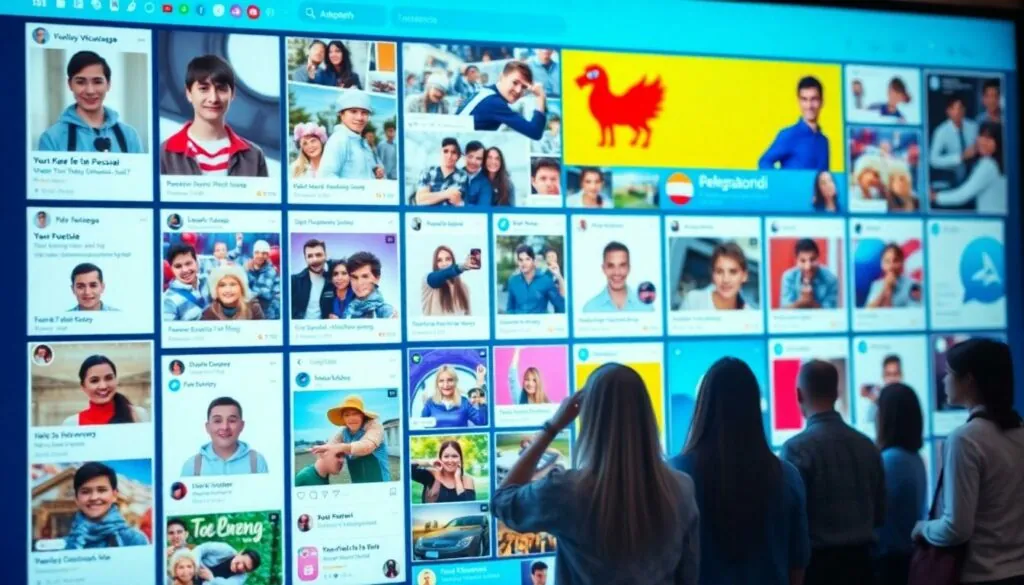Table of Contents
ToggleIn the vast digital landscape, Russian social media platforms stand out like a bear in a ballet class. With a unique blend of culture, humor, and a touch of intrigue, these platforms offer a glimpse into the heart of a nation that thrives on creativity and connection. From VKontakte’s vibrant communities to Odnoklassniki’s nostalgic charm, users find a playground where memes and meaningful conversations collide.
But it’s not just about cat videos and selfies. Russian social media is a powerful tool for expression and activism, reflecting the country’s complex social fabric. As the world watches, these platforms are shaping the narratives that matter most. So buckle up and get ready to explore the quirks and qualities that make Russian social media a fascinating topic worth diving into.
Overview Of Russian Social Media
Russian social media platforms feature unique characteristics that reflect the country’s culture and social dynamics. VKontakte (VK) serves as the largest social network in Russia, offering a space for personal expression, shared creativity, and entertainment. Users often engage with music, videos, and themed communities, creating a vibrant online experience.
Odnoklassniki (OK) appeals to older users, focusing on reconnecting with classmates and old friends. Its design encourages sharing life updates and photo albums, catering particularly to a demographic that values nostalgia and community ties.
Telegram has gained popularity for its privacy features, attracting those seeking secure communication. Russia’s tense political situation contributed to the rise of Telegram as a hub for activism and public discourse. This platform allows users to create channels for news distribution, fostering a coordinated response to social issues.
The distinctive humor prevalent in Russian social media platforms also adds a unique layer to online interactions. Memes frequently reflect local culture, news events, and even politics, providing a means of communication that resonates with users.
Face-to-face interactions supplement online conversations, as many users move seamlessly between both worlds. Offline meetups and organized events often arise from virtual connections, emphasizing the community aspect of these platforms.
Russian social media thus plays a crucial role in shaping cultural narratives and facilitating dialogue. These platforms enable individuals to navigate the complexities of their environment while expressing themselves creatively and politically.
Popular Platforms In Russia

Popular Russian social media platforms reflect the nation’s cultural landscape and social dynamics. Each plays a significant role in connecting users and fostering engagement.
VKontakte (VK)
VKontakte stands as the largest social network in Russia, attracting millions of active users. It functions as a vibrant hub for personal expression, creativity, and community building. Users share music, videos, and photos while engaging in various interest-based groups. VK also offers features similar to Facebook, enabling event organization and direct messaging. The platform’s user-friendly interface and extensive content variety enhance its popularity, making it essential for both casual and professional interaction.
Odnoklassniki (OK)
Odnoklassniki serves as a platform primarily designed for reconnecting classmates and sharing life updates. Users often include those in older demographics, allowing them to maintain connections with childhood friends. The interface emphasizes simplicity, catering to users who prefer straightforward navigation. OK facilitates various activities, including sharing photos and videos, sending messages, and participating in discussion groups. The platform also includes content tailored for family-oriented users, strengthening social ties among its members.
Telegram
Telegram is increasingly popular within Russia, primarily due to its robust privacy features. Users appreciate the anonymity and encryption it offers, making it a favorite for activists and those discussing sensitive topics. Channels and groups within Telegram foster collaboration and information sharing. Content varies from news updates to memes, creating a diverse array of discussions. Many users rely on Telegram for real-time communication and organizing events, reinforcing its role as a significant platform for public discourse.
Social Media Usage Trends
Russian social media platforms showcase unique usage patterns and evolving demographics that mirror societal changes.
Demographics
Young users make up a significant portion of social media audiences in Russia, especially on VKontakte and Instagram. Users aged 18 to 34 dominate these platforms, reflecting a youth-oriented culture and engagement with digital content. Older demographics, particularly on Odnoklassniki, focus on reconnecting with peers and family. Internet access across diverse regions also varies. Urban areas typically show higher usage rates compared to rural communities where access can limit participation. Additionally, female users often engage more actively, contributing to community discussions and content creation.
Growth Statistics
Over recent years, Russian social media platforms have experienced rapid growth. VKontakte continues to attract over 100 million monthly active users, with user engagement steadily increasing. Recent statistics show approximately 60% of the Russian population engages in social networking. Telegram saw a remarkable surge in popularity, with its user base reaching over 700 million worldwide, largely due to its privacy features. Analysts project that this trend will continue, reflecting a growing reliance on social media for news, entertainment, and community building throughout the country.
Impact On Society
Russian social media platforms significantly influence society by shaping political dialogue and promoting cultural exchange.
Political Influence
Political discourse thrives within Russian social media. Platforms like VK and Telegram provide forums for debate and activism, especially on pressing issues. Users leverage these channels to mobilize support, share news, and discuss events. In 2021, a survey revealed that 66% of respondents used social media to stay informed about political developments. Activists especially value Telegram for its privacy features, which facilitate secure communications during protests and campaigns. The ability to disseminate information quickly allows users to respond promptly to political changes, influencing public opinion.
Cultural Exchange
Cultural exchange flourishes through Russian social media platforms. Diverse content ranging from music to literature spreads easily across VK and OK. Users share cultural artifacts, engaging in discussions that highlight Russia’s rich heritage. Memes often reflect socio-political themes, sparking dialogue about local and global issues. Reports indicate that over 70% of VK users participate in groups focusing on culture and arts, showcasing the platform’s role in fostering creativity. Shared experiences contribute to a sense of community, bridging gaps between generations and regions throughout Russia.
Challenges Faced By Users
Users on Russian social media platforms encounter several significant challenges. Censorship issues pose a major barrier to free expression. Authorities often monitor content, leading to the removal of posts or accounts. VK and Telegram users experience heightened scrutiny, particularly for political discussions. A 2021 survey highlighted that 36% of users feared repercussions for online expressions. Consequently, the climate creates a chilling effect on open dialogue.
Privacy concerns also affect user experiences. Personal data protection remains a challenge on various platforms. Many users worry about data harvesting and surveillance. Telegram’s end-to-end encryption offers some reassurance, yet doubts linger about user anonymity. Reports indicate that around 58% of users are apprehensive regarding their online privacy. As a result, individuals often remain cautious when sharing personal information or engaging in sensitive conversations.
Russian social media platforms represent a fascinating intersection of culture and technology. They not only provide entertainment but also serve as vital spaces for dialogue and activism. As VKontakte and Telegram continue to grow in popularity, they reflect the evolving dynamics of Russian society.
While users enjoy the creative freedom these platforms offer, they must also navigate significant challenges related to privacy and censorship. The vibrant humor and cultural exchange found in online interactions highlight the resilience of users in the face of these obstacles.
Understanding the role of Russian social media is essential for anyone interested in the country’s cultural landscape and its ongoing social changes.

